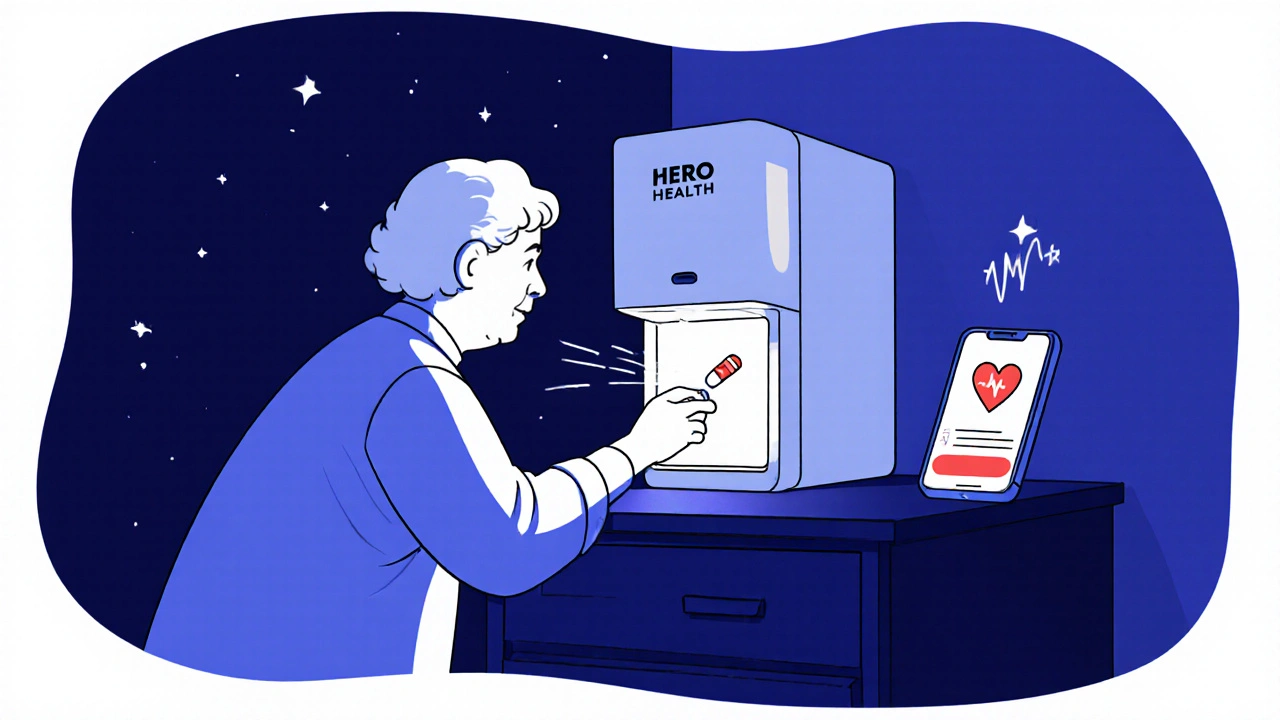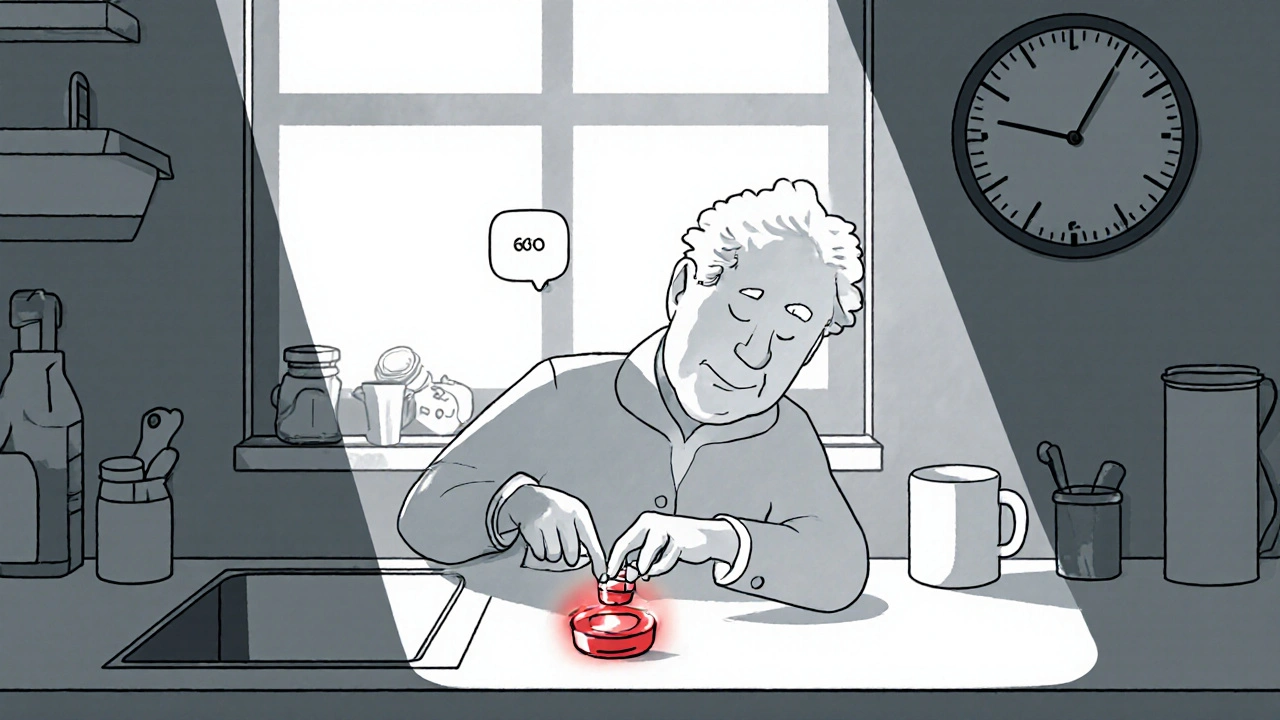Forgetting to take your pills isn’t just a minor annoyance-it can land you in the hospital. Around 50% of people with chronic conditions miss doses regularly, and for seniors taking four or more medications, that number jumps to 54%. The results? Worsening conditions, avoidable ER visits, and billions in wasted healthcare spending. But there’s a practical, proven way to fix this: smart pill caps and dispensers.
Why Forgetfulness Is a Silent Health Crisis
It’s not laziness or rebellion. It’s cognitive overload. Your brain is juggling appointments, bills, meals, and now, a dozen pills at different times. A 2023 AARP survey found that 63% of seniors who stopped using smart pill devices did so because they couldn’t keep up with the complexity-not because the tech failed. The real issue isn’t forgetting; it’s that traditional pill organizers don’t adapt to human behavior. They just sit there, empty or full, waiting for you to remember.How Smart Pill Caps Work (Without Making You Tech-Savvy)
Smart pill caps are simple: they go on your existing prescription bottle. Inside, tiny sensors track when you open it. No buttons to press. No apps to download. Just a cap that knows when you took your medicine-and tells someone if you didn’t. Take AdhereTech’s Aidia Smart Bottle. It fits standard bottles, weighs the medicine inside, and sends a signal when opened. If you miss a dose, it lights up red, sends a text to a family member, and even asks you why you skipped it-"Was it too expensive? Side effects?" That feedback helps doctors adjust your plan, not just nag you. Tenovi’s Cellular Pillbox is even simpler. It has compartments for morning, noon, night. When it’s time, a red light turns on. You open the compartment, the light turns green, and that’s it. No phone. No Wi-Fi. Just a light that says, "You did it." It’s designed for people who don’t want to learn a new app.Smart Dispensers: When You Need More Than a Reminder
If you’re taking eight pills a day, a cap isn’t enough. You need a dispenser that actually gives you the right pill at the right time. Hero Health’s automatic dispenser holds up to 28 doses. At preset times, it unlocks a compartment, flashes bright lights, and plays a loud alarm. If you don’t take it within 30 minutes, it repeats the alarm-and calls your caregiver. One user on Reddit said it saved her mother’s life during a UTI scare. The repeating alarm meant she couldn’t ignore it. These systems aren’t just about alarms. They track every dose, send reports to your doctor, and can even alert emergency services if you miss two doses in a row. For someone with dementia or severe memory loss, that’s not convenience-it’s safety.
Comparing the Top Systems
| Device | How It Works | Cost (One-Time) | Monthly Fee | Best For |
|---|---|---|---|---|
| Aidia Smart Bottle | Smart cap for standard bottles; tracks openings and weight | $149 | $39 | People who want simple, bottle-integrated tracking |
| Tenovi Cellular Pillbox | Compartment-based, cellular-connected, no app needed | $199 | $29 | Seniors who avoid smartphones or have early dementia |
| Hero Health Dispenser | Automatic dispenser with lights, alarms, and remote alerts | $499 | $0 | Complex regimens, caregivers needing remote monitoring |
| MedQ Electronic Dispenser | Repeats alarm every 30 minutes until taken | $129-$249 | $0 | People who need forced reminders, low-tech solution |
| AARDEX Pill Connect | Clinical-grade sensor cap with 70+ analytics algorithms | $299 | $49 | Clinical trials, high-risk patients with doctor oversight |
Notice something? The cheapest options don’t have monthly fees. But they also don’t connect to anyone. The pricier ones? They’re built for real-world use-where forgetting isn’t just inconvenient, it’s dangerous.
What No One Tells You About Smart Pill Tech
Not all devices are created equal. Some are just fancy timers. Others are medical tools. First, check if it’s FDA-cleared. Devices like Hero Health and AARDEX Pill Connect are Class II medical devices. That means they’ve been tested for accuracy and safety. Others? Just wellness gadgets. They might beep, but they won’t hold up in a medical emergency. Second, battery life matters. Tenovi lasts 90 days. AdhereTech lasts 30. If you forget to charge it, you’re back to square one. Third, support is everything. AdhereTech offers 24/7 clinical support. MedQ? Email-only, with 2-3 day response times. When your mother misses a dose at 2 a.m., you don’t want to wait. And here’s the biggest blind spot: no device can force you to swallow the pill. One user on Reddit admitted he opened the cap but didn’t take the pill-just to trick the system. That’s why the best systems ask why you missed it. That’s how you fix the real problem: cost, side effects, confusion.Who Benefits Most-and Who Should Skip It
Smart pill tech works best for:- Seniors taking 4+ daily medications
- People with early dementia or memory loss
- Those who’ve been hospitalized due to missed doses
- Caregivers who live far away and need updates
- You only take one or two pills a day
- You can’t afford monthly fees (63% of non-users quit because of cost)
- You’re resistant to technology or feel it’s "patronizing"

How to Get Started (Without Overwhelming Yourself)
Start simple. Don’t buy a $500 dispenser on day one.- Track your missed doses for a week. Write down when and why you forget.
- If it’s just timing, try a basic pill organizer with alarms.
- If you’re missing doses because you’re confused, get a smart cap like Aidia ($149).
- If you’re on a complex regimen or live alone, consider Hero Health.
- Ask your doctor if your insurance covers it. Medicare Advantage plans now pay for devices that reduce hospitalizations.
The Future: What’s Coming Next
The next wave isn’t just about reminding you-it’s about knowing you took it. MIT’s AgeLab is testing edible sensors that send a signal from your stomach when a pill dissolves. Imagine a system that doesn’t just track when you open the cap-but confirms you swallowed it. That’s coming by 2025. Meanwhile, companies like UnitedHealthcare are already connecting adherence data to your medical record. Miss a dose? Your doctor gets an alert before you even feel sick. That’s prevention, not just reminders.Final Thought: It’s Not About the Device. It’s About the Safety Net.
Forgetfulness isn’t a character flaw. It’s a human problem. Smart pill caps and dispensers aren’t about controlling you-they’re about giving you back control. They’re the quiet backup that says, "I’ve got you," when your memory doesn’t. The goal isn’t to become a tech expert. It’s to stay healthy. And for millions of people, that’s exactly what these devices do.Do smart pill dispensers really work?
Yes, when used correctly. Studies show adherence rates jump from around 68% to over 90% with smart systems. The key is choosing the right one for your needs-not the fanciest one. Simplicity and reliability matter more than bells and whistles.
Are smart pill caps covered by insurance?
Sometimes. Medicare Advantage plans and some private insurers now cover devices that reduce hospitalizations. Ask your doctor for a prescription and check with your plan. Devices like Hero Health and Aidia have been approved in pilot programs with major insurers.
What if I don’t have Wi-Fi or a smartphone?
You don’t need either. Tenovi’s Cellular Pillbox uses built-in cellular data. Hero Health sends alerts via phone call or text. Even the MedQ dispenser works with no internet at all. The only requirement is a working power source and a way to charge the device.
Can these devices prevent overdoses?
Some can. Locked dispensers like MedQ’s prevent access until the scheduled time. Smart caps like Aidia alert caregivers if someone opens the bottle too early. But no device stops someone from taking extra pills if they’re determined. Physical locks are the most reliable for high-risk cases like dementia.
How long do the batteries last?
It varies. Tenovi lasts up to 90 days. AdhereTech lasts about 30 days. Hero Health uses replaceable batteries that last 6-12 months. Always check the specs and plan for regular charging or battery changes to avoid gaps in monitoring.
What if the device breaks or stops working?
Most reputable brands offer warranties and customer support. Hero Health and Aidia have 24/7 clinical support. Budget models often have slow email-only help. If you rely on it for safety, choose a brand with live support and backup plans-like phone alerts or printed schedules.
Can these devices be used for pets or children?
Not designed for that. Most are built for adult-sized pills and human routines. Pet medications often require different timing and dosing. For children, consult a pediatrician-there are specialized pediatric dispensers with different safety features.

All Comments
Katelyn Sykes November 18, 2025
I got my mom an Aidia cap last year and it's been a game changer. She forgets everything from meds to birthdays but now her sister gets a text if she misses a dose. No apps, no buttons, just a cap that works. I wish we'd found this sooner.
She still doesn't like talking about it but I see her opening that bottle like clockwork now. That's all that matters.
Gabe Solack November 18, 2025
Hero Health saved my dad’s life after his heart surgery. He’d skip doses because he thought he was fine. The thing called 3 times in one night when he didn’t take his blood thinner. EMS showed up, he was in atrial fibrillation, and they stabilized him before it turned into a stroke. Worth every penny. 💯
Yash Nair November 19, 2025
USA always overcomplicating everything. In India we just use a small notebook and write it down. No wifi no battery no $500 gadget. Why you guys need so much tech for simple thing? You are lazy. My grandpa takes 8 pills a day and he never misses. Just pen and paper. You need to learn discipline not buy gadgets.
Bailey Sheppard November 20, 2025
I love how this post doesn’t just sell devices but actually explains what makes them different. The part about FDA clearance is huge. So many people buy these things thinking they’re all the same. But if you’re on anticoagulants or insulin, you need something that’s been tested. Not just a fancy alarm clock.
Also big up to Tenovi for making something that works without a phone. That’s real inclusion.
Girish Pai November 20, 2025
The real innovation here is the behavioral feedback loop. Traditional adherence tools are passive. These systems are active diagnostics. By asking why the dose was missed, you’re collecting real-time patient-reported outcomes. That’s clinical-grade data generation at scale. It’s not just compliance-it’s participatory pharmacovigilance. The predictive analytics layer alone could reduce ER visits by 30% in high-risk cohorts.
Kristi Joy November 22, 2025
If you’re thinking about getting one of these for someone you love, start small. Don’t jump to the $500 machine right away. Try a basic pillbox with a loud alarm first. Most people just need a little nudge. And if they resist? Don’t push. Just leave the device on the counter. Sometimes seeing it there is enough. Be patient. This isn’t about control. It’s about care.
Hal Nicholas November 24, 2025
I used to think these were for old people. Then my cousin’s 70-year-old aunt started using one and suddenly she was getting texts from her daughter every time she missed a pill. I swear, that woman went from forgetting her own name to being monitored like a lab rat. Who gave them the right to track your medicine like this? It’s surveillance disguised as help.
Louie Amour November 24, 2025
Let’s be real-these devices are for people who can’t handle basic responsibility. If you’re too forgetful to take your pills, maybe you shouldn’t be living alone. Or maybe you need a live-in nurse, not a $200 gadget that beeps. This isn’t innovation. It’s enabling dependency. And the monthly fees? Pure corporate greed. You’re paying to be babysat by a machine.
Kristina Williams November 25, 2025
I read somewhere that these devices are secretly linked to the government to track old people’s health data. They use the pill data to predict who’s going to die next so they can cut their Medicare. That’s why they push these so hard. The real goal isn’t health-it’s cost-cutting. And the monthly fees? That’s how they fund the surveillance. Don’t be fooled.